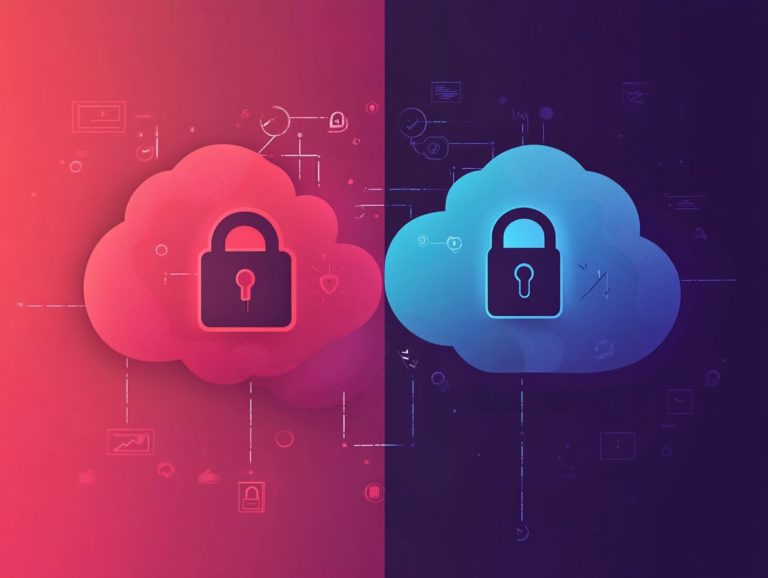5 signs it’s time for managed security services
In today s digital landscape, you may find your business struggling with cybersecurity challenges that can seem downright overwhelming.
With the surge in cyber threats and the difficulty of maintaining in-house expertise, many organizations like yours often arrive at a crossroads. Budget constraints and compliance requirements only add to the complexity, making it increasingly challenging to keep pace with ever-evolving technology.
This article brings to light five key indicators that suggest it’s time to consider managed security services. It delves into their benefits, functionality, and essential qualities to seek in a provider.
Uncover how these services can effectively mitigate cybersecurity risks and protect the future of your business.
Contents
- Key Takeaways:
- 1. Increase in Cybersecurity Threats
- 2. Lack of In-House Expertise
- 3. Limited Budget for Security Measures
- 4. Compliance Requirements
- 5. Difficulty in Keeping Up with Technology Advancements
- What Are Managed Security Services?
- Frequently Asked Questions
- What are managed security services?
- What are the top 5 signs that indicate it’s time for managed security services?
- How can managed security services help prevent cyber attacks?
- How do these services fill the expertise gap?
- Do they assist with compliance?
- Are managed security services only for big companies?
Key Takeaways:

Cybersecurity threats are increasing, making it a crucial time for businesses to invest in managed security services to protect their valuable data and systems.
Lack of in-house expertise and limited budgets can make it challenging for businesses to keep up with the rapidly evolving cybersecurity landscape, which is why learning how to transition to managed security services can be a viable solution.
Compliance requirements for various industries can be challenging to navigate. However, with the help of managed security services, businesses can ensure they are meeting all necessary regulations and standards.
1. Increase in Cybersecurity Threats
The digital landscape you navigate is increasingly fraught with cybersecurity threats. It’s time to reassess your security measures and strategies to protect your valuable digital assets and IT infrastructure from malicious activities and cybercriminals.
With sophisticated malware on the rise, ransomware attacks stand out as particularly devastating. They often cripple operations and demand exorbitant ransoms for data recovery. Meanwhile, phishing attempts have surged, skillfully manipulating employees into revealing sensitive information and escalating risks to your organization s integrity.
Recent statistics indicate that nearly 30% of organizations suffer significant financial losses after a breach. These losses frequently soar into the hundreds of thousands or even millions of dollars. These alarming figures highlight the urgent need for strong cybersecurity solutions, empowering you to proactively defend against these evolving threats while minimizing potential losses.
2. Lack of In-House Expertise
Many organizations find themselves struggling with a lack of in-house expertise in cybersecurity. This gap can significantly hinder your ability to effectively implement and manage the necessary security protocols to safeguard your IT infrastructure.
This skill gap creates vulnerabilities, leaving your business exposed to a constantly evolving landscape of cyber threats. Without the right knowledge, your teams may struggle to identify potential risks or respond swiftly to incidents.
A Chief Information Security Officer (CISO) is essential in handling these challenges, ensuring that robust security strategies are firmly in place.
The demand for managed services is clear. These providers can bridge the expertise gap by delivering tailored IT support and ongoing training, showing you 5 ways managed security services can lower costs, empowering you to enhance your security posture and minimize risks effectively.
3. Limited Budget for Security Measures
Limited budgets often hinder your ability to invest in robust cybersecurity measures, leaving you vulnerable to potential financial losses. This makes your business an enticing target for cybercriminals.
As cyber threats continue to evolve, it s vital now more than ever for you to adopt comprehensive strategies such as vulnerability management and incident response. However, this necessity complicates the financial landscape even further.
Many businesses find it challenging to allocate sufficient resources for these essential services, resulting in critical gaps in their defenses.
Fortunately, cost-effective managed services have emerged as a practical solution, enabling you to access robust security frameworks without breaking the bank. By leveraging these benefits of proactive managed security services, you can enhance your security posture and efficiently manage risks while staying well within your financial means.
Explore managed security services today to safeguard your business s future.
4. Compliance Requirements

Compliance with regulations like GDPR, HIPAA, and PCI-DSS is crucial. It helps you maintain strong security and avoid hefty penalties.
These regulations set strict guidelines for how you collect, process, and store data. You need dedicated efforts to ensure your employees are well-informed and properly trained.
Understanding these compliance requirements is vital, as they differ across industries and can significantly influence your day-to-day operations.
Regulatory compliance connects with cybersecurity measures. You must ensure that your security practices not only protect sensitive information but also align with legal obligations.
This connection helps mitigate risks and fosters a culture of accountability and security within your organization.
5. Difficulty in Keeping Up with Technology Advancements
The rapid pace of technological advancements poses significant challenges for organizations. This often leaves you vulnerable to emerging threats and system vulnerabilities.
In this dynamic environment, implementing advanced AI tools and machine learning can enhance your defenses against potential breaches. By automating threat detection and response, these technologies offer real-time insights that improve decision-making capabilities.
They can spot patterns indicative of unauthorized activity, enabling quicker intervention on your part. It s not just about having advanced tools; you must also prioritize regular security updates and proactive monitoring.
Staying ahead of evolving threats requires a proactive mindset. Continually assessing and adapting your security measures is essential in the digital landscape.
What Are Managed Security Services?
Managed security services offer comprehensive cybersecurity solutions tailored to enhance your organization’s security posture. With expert IT operations, proactive monitoring, and effective incident management, you can feel confident in knowing what to expect from managed security services to ensure your defenses are robust.
These services encompass a diverse range of components, including:
- Threat detection: Identifying and responding to potential threats quickly.
- Vulnerability assessments: Regular checks to find weaknesses in your systems.
- Security information and event management (SIEM): Monitoring and analyzing security alerts in real-time.
By leveraging advanced technologies and skilled professionals, you can effectively manage risk while adhering to industry-specific security protocols. Integrating these services streamlines your overall security strategy, enabling your business to remain resilient against evolving threats.
Managed security services allow you to stay focused on your core objectives while ensuring your cybersecurity measures adapt alongside the rapidly changing cyber landscape. These solutions empower you to tackle risks confidently and protect your valuable assets.
What Are the Benefits of Managed Security Services?
Managed security services provide a wealth of benefits, including cost-effective solutions, access to top-notch technical expertise, and enhanced incident response capabilities that can significantly elevate your organization’s security posture. It’s crucial to recognize 5 signs your team needs more security training to maximize these benefits.
By leveraging these services, you can enjoy reduced downtime thanks to rapid threat detection and response. For example, a mid-sized financial institution slashed its average incident response time by over 50% after partnering with a managed security provider, effectively minimizing potential revenue losses.
Effortless compliance with regulations becomes a reality, as these services often come equipped with the latest insights into industry standards. Companies in sectors like healthcare have reported a remarkable decline in compliance-related penalties after implementing managed security services, underscoring their vital role in protecting data and meeting regulatory demands.
How Do Managed Security Services Work?

Managed security services operate by keeping an eye on your systems continuously and using incident response strategies to identify and mitigate cybersecurity threats in real-time. This ensures your organization s digital assets remain protected.
These services blend ongoing IT support with dedicated security analysts. They continuously evaluate your environment for vulnerabilities. Continuous monitoring enables immediate detection of any suspicious activities, ensuring timely alerts to your relevant teams.
When incidents arise, a coordinated response is set in motion. This includes remediation steps that tackle the immediate threat while enhancing your overall security posture. Managed security services empower you to navigate the complex landscape of compliance, including understanding how to choose the right managed security service provider, aligning with various industry standards to ensure that all your security measures meet regulatory requirements.
What Are the Different Types of Managed Security Services?
Managed security services offer a comprehensive suite of solutions, including:
- Endpoint security
- Vulnerability management
- Threat intelligence
These services work together to establish a strong defense strategy. They ensure potential threats are detected and neutralized before any damage occurs.
For example, endpoint security focuses on safeguarding the devices connected to your network. Vulnerability management identifies weaknesses that could be exploited by malicious actors.
Threat intelligence collects and analyzes data on emerging threats, empowering you to stay one step ahead of cybercriminals.
By integrating these diverse services, you reinforce your overall security posture. This allows your business to focus on its core operations without the constant worry of cyber threats.
What Should a Business Look for in a Managed Security Services Provider?
When choosing a managed security services provider, prioritize:
- Technical expertise
- Adherence to security standards
- Robust cybersecurity solutions tailored to your needs
It’s also vital to assess the provider s industry experience and relevant certifications that showcase their commitment to excellence. Look for client testimonials to gauge the provider’s reliability and customer service approach.
Ensure their capabilities align with your organization s compliance requirements. This not only helps mitigate risks but also maintains trust with your stakeholders. A provider that understands these dynamics can significantly enhance your organization s security posture.
How Can Managed Security Services Help Mitigate Cybersecurity Risks?
Managed security services are a game-changer for reducing cybersecurity risks. They leverage advanced threat detection methods and key features of effective managed security services to protect your organization’s IT infrastructure.
These services provide ongoing assessments, enabling you to continuously evaluate your security posture and identify vulnerabilities before they can be exploited.
For instance, a financial institution collaborated with a managed security service provider to enhance its risk management strategy. Through regular vulnerability assessments, they uncovered multiple attack vectors that left them exposed to advanced persistent threats.
By implementing proactive defense mechanisms, such as real-time monitoring and threat intelligence sharing, they successfully thwarted a significant breach attempt. This case highlights the importance of a strong cybersecurity framework that adapts to evolving threats, ensuring your organization stays one step ahead.
Frequently Asked Questions

What are managed security services?
Managed security services refer to outsourced security solutions that help organizations manage and protect their digital assets and data from cyber threats.
Protect your business today consider managed security services to stay safe from cyber threats!
What are the top 5 signs that indicate it’s time for managed security services?
- Frequent cyber attacks and data breaches
- Lack of in-house expertise and resources
- Compliance and regulatory requirements
- Growing complexity of IT infrastructure
- Limited budget for cybersecurity investments
How can managed security services help prevent cyber attacks?
Managed security services offer 24/7 monitoring and threat detection, highlighting the top benefits of managed security services in 2024. This helps stop cyber attacks before they escalate.
How do these services fill the expertise gap?
They provide access to skilled cybersecurity professionals and advanced technologies. This support keeps your organization safe from threats.
Do they assist with compliance?
Yes, they help monitor compliance and offer guidance on meeting regulations. They also set up security controls to protect your data.
Are managed security services only for big companies?
Not at all! These services work for organizations of any size. They can adapt to fit your specific needs and budget.






